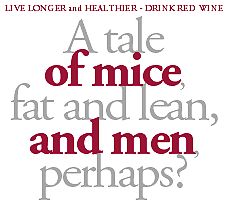Of Mice and Men and Fat and Lean
The
life-span extending effects of red wine’s resveratrol are
being followed up the evolutionary scale by David A.
Sinclair’s research group, which now reports positive
results in a mammal, the mouse (published in nature November
2OO6).
Recall* that
prolongation of life had been demonstrated previously in
resveratrol-treated yeast, roundworm, fruitfly, and fish.
The latest study describes three groups of middle-aged mice.
They neither smoked nor consumed alcohol. One group was fed
a standard diet and led a lifestyle normal for male
laboratory C57BL/6NIA mice. Two groups of the same sort of
mice were fed a high-calorie, high-fat diet and both became
obese. One of the groups of fat mice were also plied with
large doses of resveratro. The behavior and performance,
life span, numerous biochemical measurements, and organ
pathology of the three groups of mice were
compared.
Another study of
the effects of resveratrol on mice (published in cell
December 15) by a group led by Johan Auwerx, serves to
affirm and amplify the Sinclair study. The Auwerx program
used young male C57BL/6J and KKAy mice, with free access to
food and water. Half received resveratrol in
addition.
Results of the
studies seem clear. Resveratrol is salutary, at least for
mice. The obese mice treated with resveratrol remain as
healthy as the lean mice. They live much longer and look
younger than untreated fat mice, and are as active and agile
as their lean cousins fed a standard diet. Resveratrol
increases energy-producing mitochondria, preserves insulin
sensitivity and reduces the damaging effects of obesity and
the unhealthy diet on the tissues of the heart, blood
vessels and pancreas.
In the Auwerx
study, resveratrol protects mice from obesity, diabetes and
aging. It stimulates energy efficiency, induces
mitochondrial activity and tolerance to cold, and raises
resistance to muscle fatigue.
Resveratrol is
thought to work to extend life in the same way as severe
calorie restriction – a reduction of 3O to 4O percent fewer
than normal: not an easy sell. The physiological stress
induced by calorie restriction, and, it is believed,
compounds like resveratrol without such restriction,
activate the sirtuin enzyme group, stimulating a complex of
metabolic benefits. Resveratrol, whose richest source is
grape skins (thus, red wine) is just the most potent in
extending life span of a number of antioxidant polyphenols.
White wine, dark beer and cask-aged spirits contain some
too, but in lesser quantity.
There may be
important implications here for human fitness, health and
longevity, and for understanding of the French paradox.
Athletes may be interested, though such use will engender
controversy. Further research is being considered on rhesus
monkeys, which are more similar to humans than are mice.
Obesity increases the risks of cardiovascular disease and
diabetes, which has its own ravages, and probably other
age-related disorders, such as cancer and inflammation. It
is hoped that, by stimulating energy-producing mitochondria
in cells, the prevalence of neurodegenerative diseases, eg,
Alzheimer’s and Huntington’s diseases, might be reduced by
resveratrol.
It is not time,
however, to take all this to the bank. The first caveat,
obviously, is the lack, so far, of evidence that these
effects associated with resveratrol administration would
also occur safely in humans. The evidence regarding lower
doses seems conflicted. The dose of resveratrol given the
mice is equivalent in humans to hundreds of glasses of wine
daily. Both studies cited owe support to Sirtis
Pharmaceutical, cofounded by Sinclair, a prospective
commercial producer of a high-dose resveratrol pill, but
wine is so much nicer than a pill. And don’t forget alcohol,
the component of wine that is believed to provide more than
half of its health benefits.

